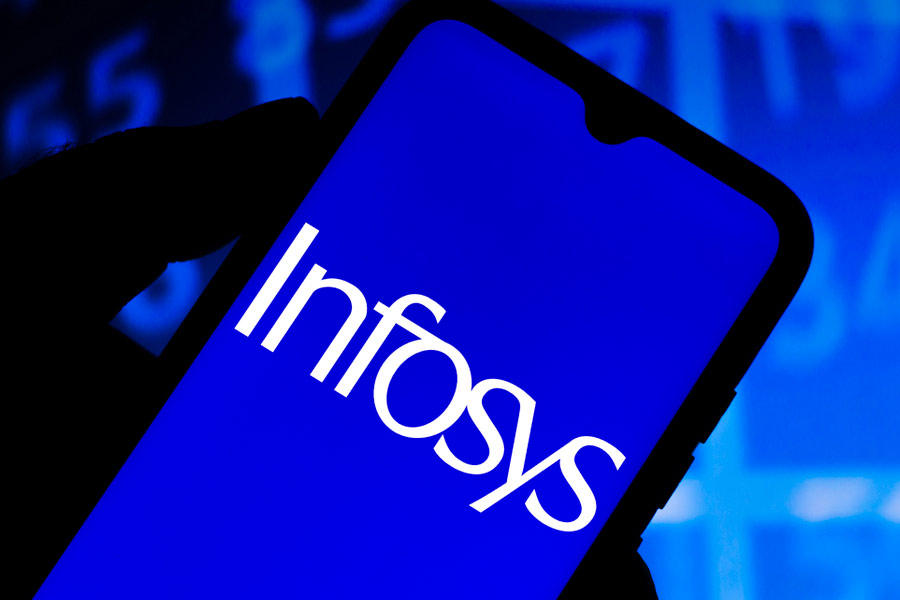Infosys, the country’s second largest IT services company, threw up a mixed bag of numbers that delighted shareholders and analysts but also puckered eyebrows.
Net profits in the fourth quarter ended March 31 vaulted 30 per cent to Rs 7,969 crore from a year-ago level of Rs 6,128 crore — far ahead of the Street’s expectations of around Rs 6,200 crore.
However, revenues rose by a piffling 1.3 per cent to Rs 37,923 crore, suggesting a rocky road to full recovery amid an uncertain macro-economic environment that has prompted the IT industry’s clients to hustle for a re-negotiation of contracts or opt for straight cancellations. Analysts had estimated that the topline would come in anywhere between Rs 38,500-38,900 crore.
But the bigger worry is that Infosys has slashed its revenue growth guidance for 2024-25 to 1-3 per cent, way below analyst estimates. In 2023-24, the Bengaluru-based company had projected revenue growth of 1.5-2 per cent.
Market circles said the Infosys stock is likely to open weak on Friday because of the muted guidance.
Infosys’s American Depositary Rights (ADRs) plunged by almost 8 per cent in pre-market trading in the US with reports suggesting that it could post the biggest post-earnings decline in five years.
In dollar terms, the software giant — with 1882 active clients and 317,240 employees to service their needs — saw revenues slide by 2.1 per cent to $4.56 billion from $4.66 billion in the previous quarter but rose by a modest 0.2 per cent from a year-ago level of $4.55 billion. Dollar revenues fell short of the consensus estimate of $4.61 billion.
Operating margins — another metric closely tracked by the Street — proved to be another let-down at 20.1 per cent during the quarter, a 90 basis point fall from 21 per cent in the same period of the previous year and 40-basis point drop from 20.5 per cent in the previous quarter (October-December 2023).
CEO and MD Salil Parekh said large deal wins in the quarter stood at $4.5 billion. For the fiscal, it came in at $17.7 billion, comprising 90 deals.
“We delivered the highest-ever large deal value in the financial year 2024. This reflects the strong trust that our clients have in us. Our capabilities in Generative AI continue to expand. We are working on client programmes, leveraging large language models with impact across software engineering, process optimisation, and customer support,” he added.
Later at a press meet, Parekh hinted that there was unlikely to be any pick up in discretionary spending this fiscal. “As we look at the start of the financial year 2025, we see the discretionary spending and digital transformation work at the same level. We see the focus on cost efficiency and consolidation continuing. Our large deal wins in 2023-24 will help us in 2024-25,” he said.
Asked about the lower revenue guidance, Parekh said the company expected discretionary spending to be around the same level as in 2023-24. He admitted that there were some concerns around some industry verticals. He reckoned financial services would perform better, but manufacturing may see lower growth.
For 2023-24, the board recommended a final dividend of Rs 20 per share and paid out an additional special dividend of Rs 8 per share. Infosys said that with this, the total payout over 2019-20 to the year ended March 31, 2024 will be 85 per cent of the free cash flow. Infosys ended the fiscal year with a free cash flow of $2.9 billion.
The board said it would continue with its capital allocation policy to return 85 per cent of free cash flows to shareholders in the five-year period beginning from the financial year 2024-25.
During the quarter, revenues from financial services and retail declined 8.5 per cent and 3.7 per cent, respectively, in constant currency terms, while other verticals showed an increase of up to 4.5 per cent.
Acquisition
In a separate announcement, Infosys announced the acquisition of in-tech, a leading engineering R&D services provider focused on the German automotive industry.
It said the strategic investment would strengthen its engineering R&D capabilities and would reaffirm its continued commitment to global clients to navigate their digital engineering journey.
The board also approved plans to incorporate wholly-owned subsidiaries in Thailand, Oman and France.










